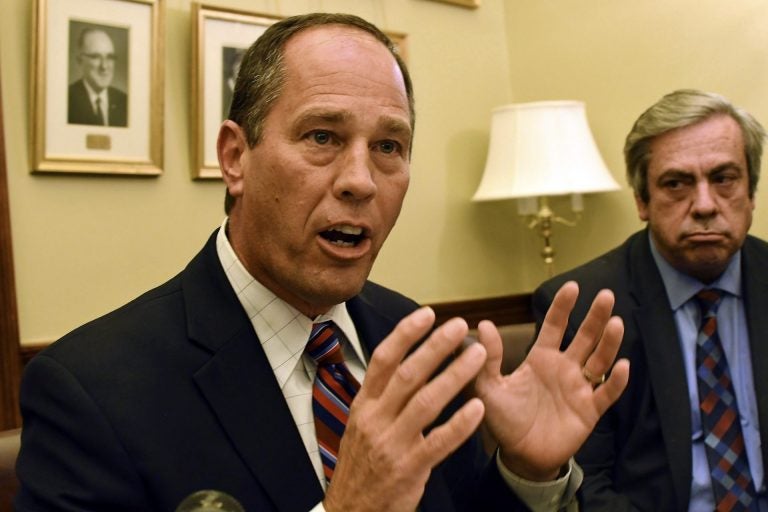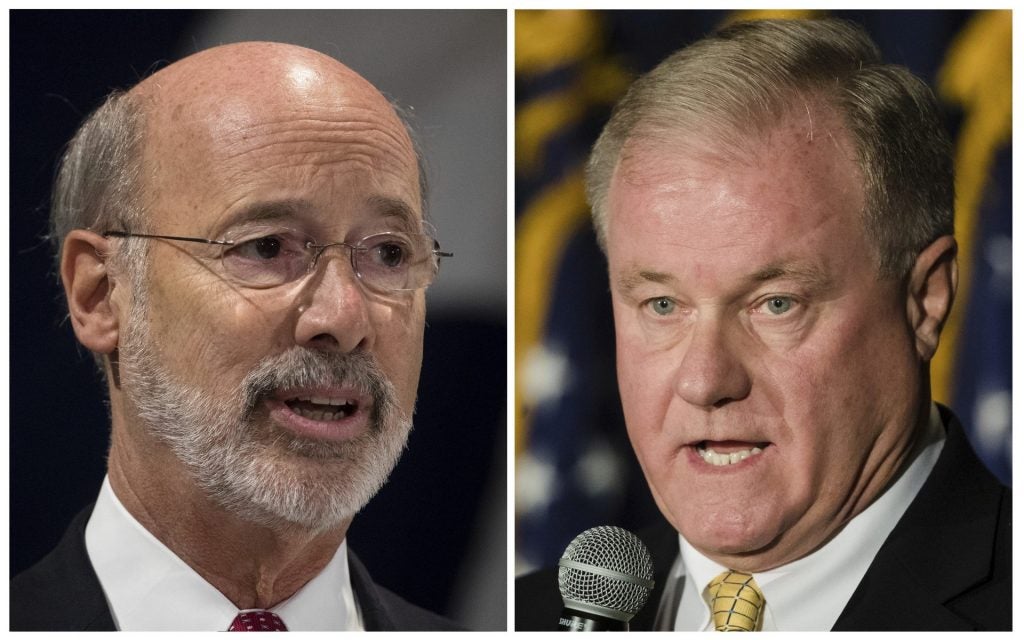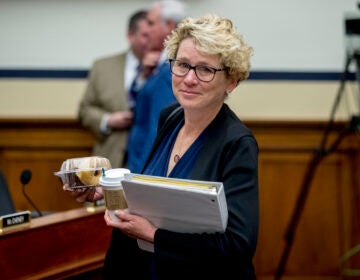Pa. Senate Dems are using a stalled sex abuse bill in campaign ads. Will it help them?
The new commercial is running in competitive districts in suburban Philadelphia.

Senate President Pro Tempore Joe Scarnati and Senate Appropriations Chair Pat Browne, both Republicans, tell reporters that the Senate hasn’t been able to produce a version of SB 261 that the House will support. Senate Democrats are now using the bill’s failure to pass as fodder to attack vulnerable members of the Senate GOP Caucus. (Marc Levy/AP Photo)
This article originally appeared on PaPost.
—
With two weeks left until election day, the campaign arm of Pennsylvania’s Senate Democratic caucus has made a major ad buy in Philadelphia and its surrounding suburbs.
The topic is a high-profile bill related to child sexual abuse by priests that faltered in the state legislature.
Democrats say it’s a legitimate critique. Republicans say it’s an unfair blow. But both parties have the same question: will this make a notable difference in key Senate races?
The discord over Senate Bill 261 is long-simmering, but it came to a head in the final hours of the state legislature’s voting session when negotiations on the measure crashed and burned.
The bill, which would have made it easier for victims of child abuse to later sue their abusers, buckled under disagreements about a provision that would have opened a two-year window for lawsuits on old cases.
The Governor, Attorney General, victim advocates, state House, and Senate Democrats support the retroactivity provision. Senate Republicans — led by President Pro Tempore Joe Scarnati — couldn’t agree on it.
Scarnati had floated a proposal to create a version of the retroactive window that wouldn’t allow suits against institutions, like Catholic churches. He and Senate GOP Appropriations Chair Pat Browne held a press conference defending it, arguing that allowing suits against churches would just compound the damage, since they provide services to people in need.
“You know,” Scarnati told the assembled reporters, “in this world, we’d all love to get everything we want … But this is a democracy.”
Ultimately, the measure never got a vote and at this point, it is unlikely to pass before the legislative session ends.
Its chief backer is Berks County Representative Mark Rozzi. He was abused by a priest when he was a teenager.
As nighttime fell and the bill failed to move, he gave its supporters a message: make this political.
“If your senator does not support a two-year window, you vote them out of office,” he said.
Now, less than two weeks before a crucial midterm election, Senate Democrats are picking up that message.
“The Pennsylvania House overwhelmingly agreed to stand with victims. They put partisanship aside to do what was right. But Republicans in the Senate? They just walked away,” intones a voice in a 30-second TV commercial that, on Wednesday, began running in the Philadelphia suburbs—one of the most competitive areas for state Senate elections.
It’s costing the Senate Democratic Campaign committee at least half a million dollars. Spokesman David Marshall said it’s their last major ad buy before the midterms — and it’s an unusual one.
Generally, he said caucus committees run ads on specific candidates — not legislative issues.
But he argued that voters care about the sexual abuse bill. And if Senate Democrats are going to pick up multiple seats anywhere, it’ll be the collar cities.
Marshall is up-front about that.
“It’s [running there] because some of those members are in top-targeted races,” he said. “This is, I think a fair critique of every member of the Republican Senate. We could have put all of them up there, really.”
The spot lists eight senators by name. Three are in leadership — Scarnati, Majority Leader Jake Corman, and Browne.
Scarnati is not up for reelection, but Corman (of Centre County) and Browne (of Chester County) are both facing fairly robust challenges. The ads are running in digital form on Corman’s home turf and are on TV in Browne’s district.
The other five Senators named represent districts in the southeast. All those seats are up for reelection next month, and all are considered competitive for Democrats.
Four are held by Senator Robert — commonly known as “Tommy” — Tomlinson of Bucks County, Thomas McGarrigle of Chester, and John Rafferty and Bob Mensch, both of Berks.
Senator Stewart Greenleaf holds the fifth seat, in Bucks. He’s retiring, but his son, who has the same name, is in a contested race to replace him.
Apart from Mensch’s, all those districts went for Clinton in 2016. And even Mensch said this late-in-the-game hit isn’t ideal.
“I wouldn’t be concerned, I wouldn’t be so burned up about it if I didn’t think it would have some adverse effect,” he said.
Republicans immediately expressed outrage over the advertising—primarily because aside from the leadership and Greenleaf, all the senators named actually support opening a two-year window for lawsuits on statute-limited abuse cases.
“I have been meeting with Scarnati. Still talking to him. Still trying to, hopefully, get us back up there this year to do something about it. But if not and I’m reelected, it’s the first bill I’m introducing this year in the Senate,” McGarrigle said.
He spoke just before heading out for a rally with a number of abuse survivors; he said it was planned before the ad dropped.
McGarrigle thinks the Democrats’ effort to make the issue political is a low blow. He said he wanted a vote on SB 261 so much, he stayed at the Capitol late and missed the birth of his first grandchild.
“You know, I don’t care what they say about me,” he said. “But they’re using the victims as pawns in this…It’s unbelievable.”
That is a sentiment Scarnati echoed. In a statement, he said it’s “curious” Republicans who support the abuse bill are being targeted. And he added, he thinks Democrats are showing more concern for winning campaigns than for abuse victims.
Marshall maintained the ad is warranted.
“[Senate Republicans] are in the super majority,” he said. “They elected the leadership that chooses whether or not this comes up for a vote. They couldn’t get Joe Scarnati to move on it. I don’t think they get to sit there and say, ‘I support it.’”
So, will voters care?
Widener University political science professor Wes Leckrone thinks the answer might be yes.
For one, he said the issue of sexual abuse by clergy in Pennsylvania ties into larger national stories — and that can be a powerful way to sway voters.
“I think it really builds off the energy of the Kavanaugh-Ford hearings, in that there are victims that aren’t getting their voices heard,” he said.
Plus, Leckrone added, the timing works well for Democrats.
“The problem is they don’t really have time to respond, right? Unless they have a lot of campaign cash — in which case they’re put immediately on the defensive,” he said.
Senate Republicans haven’t made any moves to counter with their own ads.
Senate Democrats aren’t the only ones who have tied the statute of limitations issue into their campaign messaging. Republican gubernatorial candidate Scott Wagner is using it to criticize Democratic Governor Tom Wolf.

Wolf “has the ability to call the legislature back into session to act on this and he hasn’t done so, and that’s a contrast between him and Scott,” said Wagner’s campaign spokesman Andrew Romeo — making an argument that is pretty similar to the one espoused by Senate Democrats.
“If Scott were governor right now,” Romeo said, “he would have called a special session and made them act and pass these reforms.”
A spokeswoman for Wolf said Wagner, who is trailing in the polls, is desperate. And she echoed Senate Republicans, saying this shouldn’t be a political issue, and that Wolf wants lawmakers to finish the bill.
Right now though, there’s no sign of a deal.
WHYY is your source for fact-based, in-depth journalism and information. As a nonprofit organization, we rely on financial support from readers like you. Please give today.





